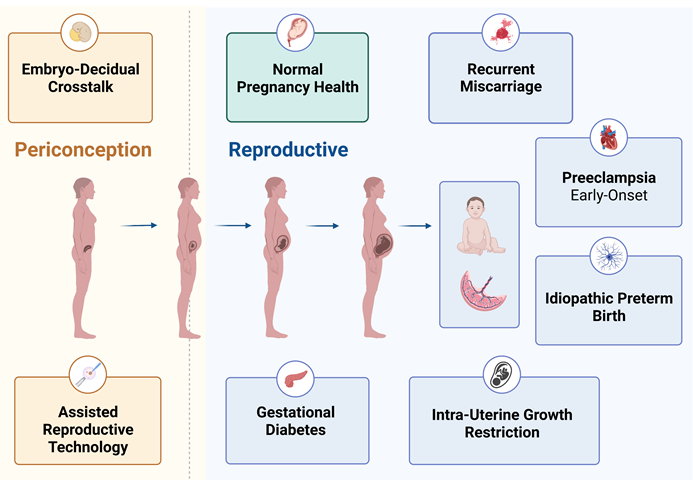
Research Focus Areas 1
Our research endeavors to decipher the pathophysiology of pregnancy-related pathologies including preeclampsia (PET), intrauterine growth restriction (IUGR), recurrent pregnancy loss, and preterm delivery (PTD), while also exploring potential novel therapeutic targets for these disorders. Furthermore, it aims to enhance our understanding of embryo-decidual cross-talk during IVF-embryo transfer, thereby advancing assisted reproductive technology (ART) techniques to improve tangible outcomes such as increased take-home baby and conception rates, alongside a reduction in miscarriage rates.
Research Focus Areas 2
Our research endeavors to investigate the effectiveness of using specific placental biomarkers, as potential predictors of adverse outcomes in individuals experiencing idiopathic Recurrent Pregnancy Loss (RPL). Idiopathic RPL refers to recurrent miscarriages with unknown causes. By analyzing these biomarkers, we aim to discern patterns or levels that may correlate with increased risk or likelihood of adverse outcomes such as further miscarriages or complications during pregnancy.
The ultimate goal of this investigation is to identify reliable prognostic indicators that can aid healthcare professionals in better managing and guiding patients with RPL. By recognizing these biomarkers as predictive tools, clinicians may be able to offer more personalized and timely interventions to mitigate risks and improve overall pregnancy outcomes for individuals experiencing RPL. This could potentially lead to advancements in clinical management strategies, ultimately enhancing the chances of successful pregnancies and reducing the emotional and physical burden associated with recurrent pregnancy loss
Research Focus Areas 3
Our research endeavors to explore the effects of maternal obesity and the antiretroviral medication dolutegravir (DTG) on placental function and fetal development in pregnant women living with HIV. Maternal obesity and the use of DTG during pregnancy are factors that may potentially influence the health and development of the placenta, as well as impact fetal growth and well-being.
By examining these factors, we seek to gain a deeper understanding of how maternal obesity and DTG exposure may interact with placental function, potentially affecting nutrient exchange, oxygenation, and hormonal regulation crucial for fetal development. Additionally, we aim to investigate any potential implications for fetal growth, organ development, and overall pregnancy outcomes in this population.
This research endeavor holds the potential to provide valuable insights into the complex interplay between maternal health factors, antiretroviral therapy, placental function, and fetal development in the context of HIV-positive pregnancies. The findings may inform clinical practice and contribute to the development of tailored management strategies aimed at optimizing maternal and fetal health outcomes in this vulnerable population.
